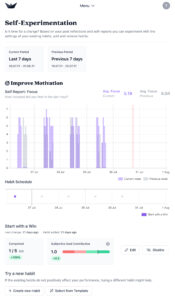Project – Self-experimentation and Reflection at Work to Form Productive Habits
It has been shown that forming habits can be beneficial in various areas such as well-being or productivity. However, the process of selecting the appropriate habits and acquiring them is subject to high variance amongst different individuals. To address this, we propose a self-experimentation framework that aims to support the acquisition of positive habits to increase productivity and wellbeing at work. The framework is designed as an iterative cycle in which users define their goals, identify habits they want to develop, track their progress using self-reports, reflect on their workday and make periodic refinements to tailor the framework to their needs. To identify how the framework could be supported by software, we developed a tool called yaht which collects and visualises the users’ data and provides timely reminders for various steps within the framework.
The framework and the tool were evaluated during a three week study which revealed that users are generally interested in establishing habits for improving their performance and well-being at work. Furthermore, most aspects of the framework such as the reflections and the self-reports were considered helpful. However, we also found that iterative self-experimentation requires thorough explanation, guidance and motivation to work properly. Without clear explanation and step-by-step guidance through the framework, users felt overwhelmed or did not see the benefit of going through all the steps. Based on these findings, we discuss the lessons-learned and make suggestions for future improvements of the framework and its implementation.
Students: Sebastian Richner and Michael Ziörjen
Supervisors: Anastasia Ruvimova, Alexander Lill, and Thomas Fritz, Prof. Dr.
Date: Feb-Sep 2021
